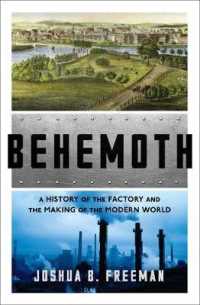基本説明
New in paperback. Hardcover was published in 2005. How do communities survive catastrophe? Using classical Athens as its case study, this book argues that if a democratic community is to survive over time, its people must choose to go on together.
Full Description
How do communities survive catastrophe? Using classical Athens as its case study, this book argues that if a democratic community is to survive over time, its people must choose to go on together. That choice often entails hardship and hard bargains. In good times, going on together presents few difficulties. But in the face of loss, disruption, and civil war, it requires tragic sacrifices and agonizing compromises. Athenian Legacies demonstrates with flair and verve how the people of one influential political community rebuilt their democratic government, rewove their social fabric, and, through thick and thin, went on together. The book's essays address amnesty, civic education, and institutional innovation in early Athens, a city that built and lost an empire while experiencing plague, war, economic trauma, and civil conflict. As Ober vividly demonstrates, Athenians became adept at collective survival. They conjoined a cultural commitment to government by the people with new institutions that captured the social and technical knowledge of a diverse population to recover from revolution, foreign occupation, and the ravages of war.
Ober provides insight into notorious instances of Athenian injustice, explaining why slaves, women, and foreign residents willingly risked their lives to support a regime in which they were systematically mistreated. He answers the question of why Socrates never left a city he said was badly governed. At a time when social scientists debate the cultural grounding necessary to foster democracy, Athenian Legacies advances new arguments about the role of diversity and the relevance of shared understanding of the past in creating democracies that flourish when the going gets rough.
Contents
List of Abbreviations ix Preface xi Chapter One: Introduction: Climbing the Hill of Ares 1 Chapter Two: Classical Athenian Democracy and Democracy Today 27 Chapter Three: Historical Legacies: Moral Authority and the Useable Past 43 Chapter Four: Culture, Thin Coherence, and the Persistence of Politics 69 Chapter Five: Quasi Rights: Participatory Citizenship and Negative Liberties 92 Chapter Six: The Athenian Debate over Civic Education 128 Chapter Seven: Living Freely as a Slave of the Law: Why Socrates Lives in Athens 157 Chapter Eight: Social Science History, Cultural History, and the Amnesty of 403 b.c. 171 Chapter Nine: Greek Horoi: Artifactual Texts and the Contingency of Meaning 183 Chapter Ten: Tyrant-Killing as Therapeutic Conflict: A Political Debate in Images and Texts 212 Bibliography 249 Index 267








